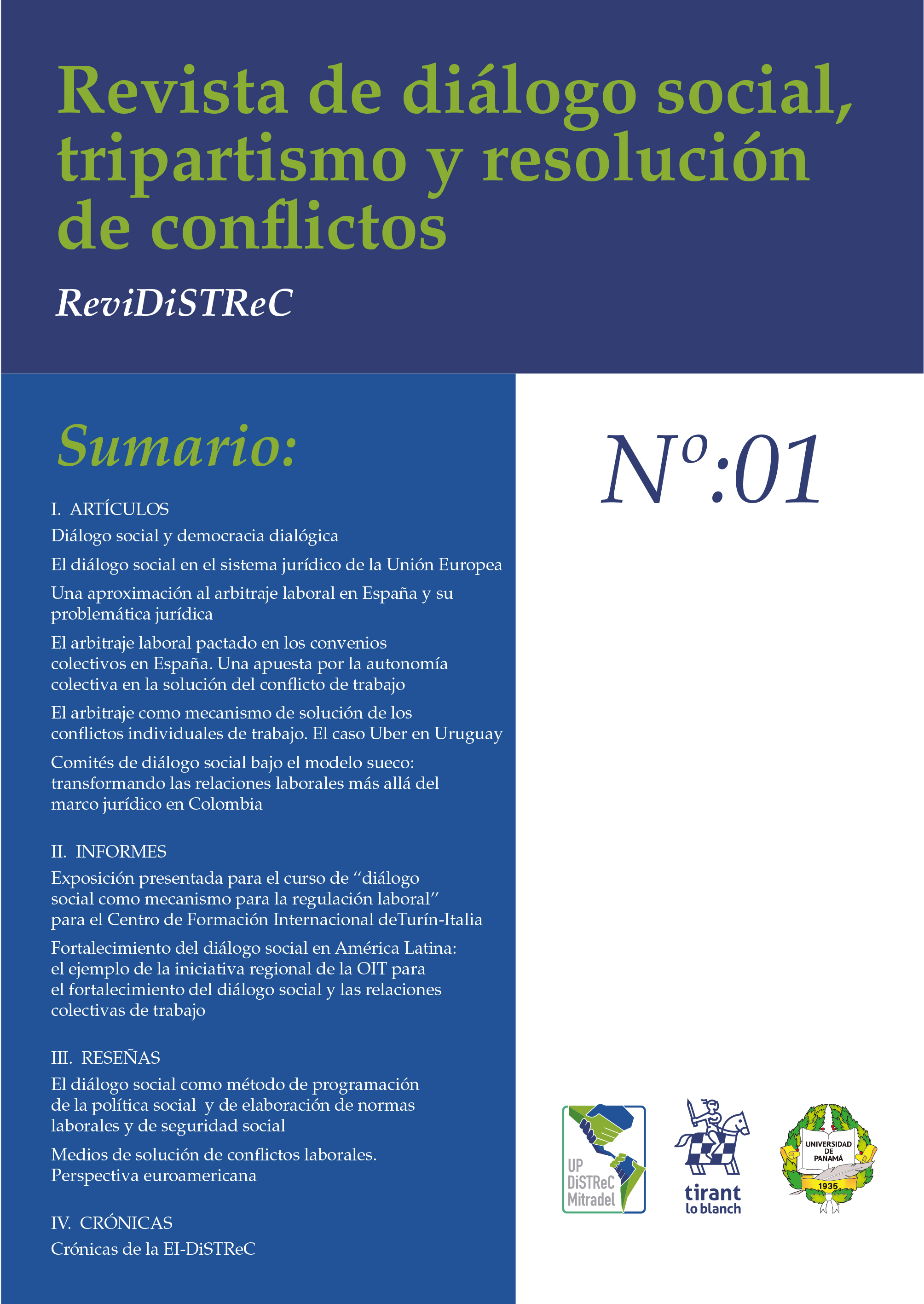Arbitration as a mechanism for the settlement of individual labour disputes. The Uber case in Uruguay
Published 2025-07-09
Keywords
- resolution of labor disputes,
- arbitration,
- individual labor disputes,
- platform economy,
- Uber Uruguay
How to Cite
Abstract
This paper analyses the admissibility and limits of arbitration as an alternative mechanism for resolving individual labour disputes in Uruguay, with special emphasis on the platform economy and the Uber case. It examines the national and international regulatory framework, highlighting the restrictions imposed by labour law on the unilateral imposition of arbitration clauses in labour contracts.
The paper argues that arbitration in individual labour disputes is not compatible with the essential principles of labour law, due to the structural inequality between the parties, the non-waivability of labour rights and the right of access to justice. Through the analysis of the laws for abbreviating labour trials, the general law on private international law and the law on the protection of work carried out through digital platforms, it is demonstrated that the Uruguayan legal system grants exclusive jurisdiction to labour courts in this type of dispute, ruling out the validity of arbitration clauses imposed unilaterally by the employer.
The study also analyses the evolution of Uruguayan jurisprudence regarding arbitration in individual labour disputes, revealing a majority tendency to reject it, especially in cases where its application violates fundamental principles of labour law. Finally, the study concludes that the prohibition of submitting these conflicts to arbitration is not only a requirement of current regulations, but also an indispensable condition to guarantee the effective protection of workers’ rights.
Downloads
References
- BARBAGELATA, H. H., “El particularismo del Derecho del Trabajo”, FCU, Montevideo, 1995.
- CHANGALA, R. y FERNÁNDEZ BRIGNONI, H., “Medios de solución de los conflictos de trabajo”, Servicio de Documentación Jurídica, N° 109, FCU, Montevideo, 198.
- DE LA RIVA, A., “Algunos apuntes sobre el arbitraje en el nuevo proceso laboral”, Revista Derecho Laboral, Nº 255, FCU, 2014.
- DE LA RIVA, A., “El arbitraje en el derecho individual del trabajo”, Derecho procesal del trabajo. Treinta estudios, FCU, 2005.
- DE LA RIVA, A., “El nuevo régimen de arbitraje aprobado por la Ley 20.257 y su impacto en el deporte profesional”, Anuario de Derecho Deportivo, Nº 4, La Ley Uruguay, 2024.
- DE LA RIVA, A., “Nuevamente sobre el arbitraje y el Derecho del Trabajo en el marco del deporte”, Revista de Derecho del Deporte, Nº 1, La Ley Uruguay, 2018.
- ERMIDA URIARTE, O., “Algunas reflexiones sobre los conflictos laborales, el arbitraje y la justicia del trabajo”, Anales del Foro, N° 43-44, 1983.
- GARMENDIA, M., “El Arbitraje y acceso a la Justicia del Trabajo”, Revista Derecho Laboral, Nº 195, FCU, 1999.
- GARMENDIA, M., “Mecanismos alternativos de solución de conflictos individuales de trabajo”, Revista Derecho Laboral, Nº 185, FCU, 1997.
- GARMENDIA, M., “Medios de solución de conflictos colectivos”, Revista Laborem, Nº 20, Sociedad Peruana de Derecho del Trabajo y de la Seguridad Social, 2017, https://www.spdtss.org.pe/wp-content/uploads/2021/09/Laborem20-143-156.pdf.
- OIT, “Conciliación y Arbitraje en los Conflictos de Trabajo”, Ginebra, 1981.
- PEREIRA CAMPOS, S., “Los laudos arbitrales en materia laboral”, Treinta y Seis estudios sobre las Fuentes del Derecho del Trabajo, FCU, Montevideo, 1995.
- PLÁ RODRÍGUEZ, A., “Los principios del Derecho del Trabajo”, 3ª Edición, Depalma, Buenos Aires.
- PLÁ RODRÍGUEZ, A., “Reflexiones sobre el derecho internacional del trabajo”, Revista Derecho Laboral, Nº 100, FCU, Montevideo, 1975.
- ROSENBAUM CARLI, F., “Interpretación e integración en la Ley Nº 18.572”, Revista Derecho Laboral, Nº 245, FCU, Montevideo, 2012.
- SARTHOU, H., “Aspectos de la autonomía de la voluntad en el derecho del trabajo”, Revista Derecho Laboral, N° 86-87-88, 1972.
- SUPIOT, A., Crítica de Derecho del trabajo, Ministerio de Trabajo y Asuntos Sociales, Madrid, 1996.
- Normas y sentencias
- Antecedentes parlamentarios: https://parlamento.gub.uy/documentosyleyes/ficha-asunto/38377.
- Constitución de la República.
- Suprema Corte de Justicia; Sent. Nº 596/2017; 08.05.2017.
- Suprema Corte de Justicia; Sent. Nº 911/2023; 14.09.2023.
- Tribunal de Apelaciones del Trabajo de 1º Turno; Sent. Nº 18/2024; 21.02.2024.
- Tribunal de Apelaciones del Trabajo de 3º Turno; Sent. Nº 118/2024; 13.06.2024.
- Tribunal de Apelaciones del Trabajo de 1º Turno; Sent. Nº 89/2020; 03.06.2020.
- Tribunal de Apelaciones del Trabajo de 3º Turno; Sent. Nº 149/2019; 26.04.2019.
- Tribunal de Apelaciones del Trabajo de 1º Turno; Sent. Nº 111/2020.
- Tribunal de Apelaciones del Trabajo de 1º Turno; Sent. Nº 111/2020; 03.06.2020.
- Tribunal de Apelaciones del Trabajo de 1º Turno; Sent. Nº 111/2020; 03.06.2020.
- Tribunal de Apelaciones del Trabajo de 2º Turno; Sent. Nº 297/2020; 25.11.2020.
- Tribunal de Apelaciones del Trabajo de 1º Turno; Sent. Nº 111/2020; 03.06.2020.
- Tribunal de Apelaciones del Trabajo de 3º Turno; Sent. Nº 131/2022; 01.06.2022.
- Tribunal de Apelaciones del Trabajo de 2º Turno; Sent. Nº 33/2022; 18.05.2022.
- Tribunal de Apelaciones del Trabajo de 2º Turno; Sent. Nº 297/2020; 25.11.2020.
- Tribunal de Apelaciones del Trabajo de 4º Turno; Sent. Nº 267/2023; 06.12.2023.
- CIDH, Sentencia de 22 de septiembre de 2006.

